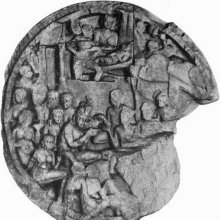Somanassa, Somanassā: 6 definitions
Introduction:
Somanassa means something in Buddhism, Pali. If you want to know the exact meaning, history, etymology or English translation of this term then check out the descriptions on this page. Add your comment or reference to a book if you want to contribute to this summary article.
Images (photo gallery)
In Buddhism
Theravada (major branch of Buddhism)
Source: Pali Kanon: Pali Proper Names1. Somanassa. A king of Videha, who is credited with having founded the city of Mithila. J.vi.47, 51.
2. Somanassa. The Bodhisatta born as the son of Renu, king of Uttarapancala. See the Somanassa Jataka.
3. Somanassa. A Pacceka Buddha. Once, when the Buddha was staying at Indasalaguha in Vediyakapabbata, an owl became fond of him, and even when he went for alms would accompany him half way, wait for his return, and then go back with him. One day when the Buddha was seated in the assembly of monks, the owl descended from its rock and worshipped him by lowering its wings, putting together its claws and bending its head.
The Buddha, seeing this, smiled, and said, in answer to Anandas question, that one hundred thousand kappas hence the bird would become a Pacceka Buddha, Somanassa by name. MA.i.255f.; KhpA.151.
-- or --
. Wife of Siddhattha Buddha before his renunciation. BuA.185; but Bu.xvii. calls her Sumana.
Source: Journey to Nibbana: Patthana DhamaSomanassa is mental pleasure or pleasant feeling in mind.
Source: Pali Kanon: Manual of Buddhist Terms and Doctrineslit 'glad-minded-ness' (su+manas+ya), gladness, joy; identical with 'mentally agreeable feeling' (cetasikā sukhā vedanā), belongs to the feeling-group (vedanā-kkhandha, s. khandha II), and is enumerated amongst the 22 faculties (indriya, q.v.).
It may or may not be associated with karmically wholesome consciousness (s. Tab. I. 1-4, 9-12, 18-21), with karmically unwholesome consciousness (greedy c. ib. 22-25), and with karmically neutral consciousness (ib. 40, 42-45, 57-60, 66-69, 72-76. 81-84), -
Somanassa is not identical with pīti (q.v.).
Source: Dhamma Study: Cetasikaspleasant feeling;
Theravāda is a major branch of Buddhism having the the Pali canon (tipitaka) as their canonical literature, which includes the vinaya-pitaka (monastic rules), the sutta-pitaka (Buddhist sermons) and the abhidhamma-pitaka (philosophy and psychology).
Languages of India and abroad
Pali-English dictionary
Source: BuddhaSasana: Concise Pali-English Dictionarysomanassa : (nt.) joy; delight; happiness.
Source: Sutta: The Pali Text Society's Pali-English DictionarySomanassa, (nt.) (fr. su+mano; cp. domanassa) mental ease, happiness, joy D. I, 3; II, 278; III, 270; M. I, 85, 313; S. IV, 232; A. II, 69; III, 207, 238; Dh. 341; Sn. 67; Pug. 59; VbhA. 73; PvA. 6, 14, 133; DA. I, 53; it is more than sukha D. II, 214; defined at Vism. 461 (iṭṭh’ārammaṇ’‹-› ânubhavana-lakkhaṇaṃ, etc.). A syn. of it is veda 1. On term see also Cpd. 277.

Pali is the language of the Tipiṭaka, which is the sacred canon of Theravāda Buddhism and contains much of the Buddha’s speech. Closeley related to Sanskrit, both languages are used interchangeably between religions.
See also (Relevant definitions)
Starts with: Somanassa Jataka, Somanassajata, Somanassamalaka, Somanassindriya.
Full-text (+12): Gladness, Joy, Somanassita, Dibbacakkhu, Kamavacara Citta, Somanassa Jataka, Somanassindriya, Kiriya Citta, Vedajata, Piti, Gehasita, Vedana, Mahakusala Citta, Lobha Mula Citta, Kusalavipaka Citta, Indriya, Renu, Vediya, Suddhika Sutta, Domanassa.
Relevant text
Search found 24 books and stories containing Somanassa, Somanassā; (plurals include: Somanassas, Somanassās). You can also click to the full overview containing English textual excerpts. Below are direct links for the most relevant articles:
Cetasikas (by Nina van Gorkom)
Appendix 1 - Appendix To Chapter 2 < [Appendix And Glossary]
Chapter 2 - Feeling < [Part I - The Universals]
Chapter 11 - Enthusiasm < [Part II - The Particulars (pakinnaka)]
Abhidhamma in Daily Life (by Ashin Janakabhivamsa) (by Ashin Janakabhivamsa)
Factor 2 - Vedana (feeling, sensation) < [Chapter 4 - Cetasikas Associated With Both Good And Bad Cittas (mind)]
Factor 10 - Mudita (sympathetic joy) < [Chapter 3 - On kusala cetasikas (wholesome mental factors)]
Factor 12 - Piti (joyful satisfaction) < [Chapter 4 - Cetasikas Associated With Both Good And Bad Cittas (mind)]
A Manual of Abhidhamma (by Nārada Thera)
Beautiful Consciousness of the Sensuous Sphere < [Chapter I - Different Types of Consciousness]
The Procedure of Retention < [Chapter IV - Analysis of Thought-Processes]
Diagrams < [Chapter I - Different Types of Consciousness]
Amaravati Art in the Context of Andhra Archaeology (by Sreyashi Ray chowdhuri)
Somanassa Jātaka < [Chapter 3 - Amarāvatī and the Formative Stage of the Buddhist Art]
Abhidhamma in Daily Life (by Nina Van Gorkom)
Chapter 19 - The Sobhana Cittas In Our Life
Chapter 11 - Different Types Of Patisandhi-citta
Patthana Dhamma (by Htoo Naing)
